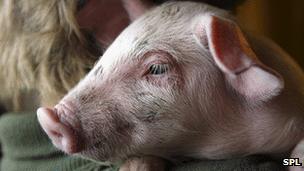Animal transplants coming 'soon'
- Published

Pigs are seen as one of the best sources of organs
Are pigs about to migrate from the dinner table to the operating table?
Using animals as a source of organs for transplantation into humans was once one of medicine's next big things - a solution to transplant waiting lists.
However, there have been problems with rejection - and recently stem cells have been grabbing the spotlight.
But some researchers are now saying that transplants from animals "could soon become a reality", but not necessarily as originally expected.
There is still a pressing need for organs. In the UK there are 8,000 people on the waiting list - three die every day.
Several technologies are trying to meet the demand. In August, a patient from London was the first in the UK to have his heart replaced with a mechanical one while stem cells have been used for simple structures such as the windpipe.
However, using stem cells to build more complicated organs such as a heart is a long way off and mechanical body parts are used in the short term before an actual transplant.
Using animals as a source - known as "xenotransplantation" - is another potential solution.
Whole organs
Pigs have been used as a source of heart valves, which control the flow of blood around the heart. Here the pig cells are chemically stripped away and when the remaining structure is transplanted, human cells grow around it.
Stripping away the living material would not work for most transplants - nobody would want the heart that did not beat.
However, that living material has a big problem, namely rejection. The human immune system attacks the pig tissue, which it recognises as foreign.
Dr David Cooper from the University of Pittsburgh Medical Centre is one of a group of researchers arguing in the Lancet, external that the problems with organ rejection are being overcome.
Some pigs - GTKO pigs - have been genetically modified. They no longer produce a pig protein, galactosyltransferase, which the immune system would have attacked.
The authors say that this kind of rejection is "not the main cause of graft failure", however, "other issues have become more prominent".
Problems such as damaging blood clots and inflammation will require further genetic modification.
As a result they say that: "Overall, clinical pig organ xenotransplantation will probably not be undertaken in the next few years."
Smaller scale, greater promise
While therapies are distant on the whole organ level, they believe researchers are getting closer to transplanting small numbers of cells.
In patients with type 1 diabetes, the immune system attacks islet cells in the pancreas, which control sugar levels.
Most people can manage the condition with insulin, but some have therapy to replace the lost cells. Around one in 500 patients with type 1 diabetes have unpredictable low sugar levels and only those are currently suitable for the treatment.
However, in the UK there is a waiting time of up to 18 months and the number of cells which can be transplanted to each patient is limited.
The authors argue that using pigs as a source for these cells is "much more encouraging", than using whole organ transplants.
They write: "Because pig insulin was given to patients with diabetes for decades, and because a diabetic monkey survived for more than one year supported only by pig islets, clinical pig-islet xenotransplantation will almost certainly be physiologically successful."
Clinical trials are underway in New Zealand to test that theory.
Dr Martin Rutter, senior lecturer at the University of Manchester, said he was "interested, but cautious".
He warned that: "It is still not clear whether it is an effective treatment or a safe treatment.
"If it proves safe and effective it could be an amazing development."
It has also been suggested that some cells in the brain could be transplanted to ease neurodegenerative diseases such as Parkinson's or that pigs could be a source of corneas.
"With regard to pig tissues and cells, as opposed to organs, it would seem that clinical xenotransplantation could soon become a reality," the researchers conclude.
NHS Blood and Transplant said organs from animals had huge potential for the future to fill the gap between availability and demand, but there were "many complex issues still to overcome" and that there was "still a long way to go".
It says until then, getting more people to donate organs would be the most successful strategy.
- Published2 August 2011
- Published7 July 2011
- Published11 October 2011